Welcome to another weekly BookNotes, the newsletter of Hearts & Minds, a small-town bookstore (where we are still struggling with Covid-safety questions and doing backyard customer service) here in south-central PA. We’re in our 40th year and for a long while we’ve been sending out these book reviews, announcing just some of the many books we carry. All the old BookNotes are all archived at our website.
Sometimes we curate themed reviews, listing recent books that more or less fit a topic. For instance last week we did a set of mostly short books, mostly for pastors who might need some refreshment; here we did one on recent books about racial justice; here is a longer review of More Than Things and some other books that fit with the heavy book on the theological /philosophical social ethic of personalism. Here’s one we did on books about nature writing, creation-care and eco-theology. I hope you saw this one on books on masculinity and what some call “toxic masculinity.” And those are just from the last few months.
Often, though, we just tell about a batch of new books that have arrived here that we are hoping to mail out to our faithful online customers. Here’s one of those sorts of catch-all BookNotes, naming a dozen books that are, mostly, quite new, the sorts of thoughtful stuff we thought many of our readers might care about. ALL ARE 20% OFF.
FIRST though, there’s an invite for a very special pre-order that we’re eager to tell you about. You can pre-order anything, anytime, but this one — The Just Kitchen: Invitations to Sustainability, Cooking, Connection, and Celebration by Derrick Weston & Anna Woofenden is fantastic and it’s coming soon. Read on!
Read down to the very end of the column so you see all twelve, and then simply click on that link at the bottom to place an order. Or click the one that says “inquire” if you have questions about any of these — or anything else. As a full-service bookstore, we’re happy to help.
LET’S START WITH THIS VERY SPECIAL PRE-ORDER OPTION
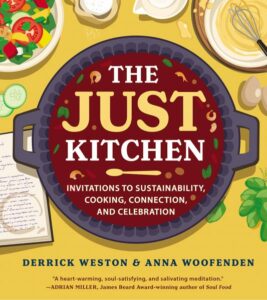 The Just Kitchen: Invitations to Sustainability, Cooking, Connection, and Celebration Derrick Weston & Anna Woofenden (Broadleaf Books) $29.99 OUR SALE PRICE 20% off = $23.99 / PREORDER NOW
The Just Kitchen: Invitations to Sustainability, Cooking, Connection, and Celebration Derrick Weston & Anna Woofenden (Broadleaf Books) $29.99 OUR SALE PRICE 20% off = $23.99 / PREORDER NOW
NOT YET RELEASED –due October 10, 2023
Derrick is an old Pittsburgh Presbyterian, urban ministry guy, and now a food and faith podcaster and gardening activist in Baltimore. His official bio says that he manages the Rockrose City Farm on Baltimore’s east side, growing food for ministries that distribute to those who are food insecure. A documentary filmmaker, producer, and former Presbyterian minister, Derrick is a firm believer in using one’s voice and the media to inspire and enact social change. Indeed!
You may know of Anna, who wrote a book we adored and that I wrote about briefly a time or two here at BookNotes, This Is God’s Table: Finding Church Beyond the Walls. That great memoir was about her essentially creating a fresh expression of the inclusive church by inviting folks to urban gardening. Her bio notes that she remains the pastor of both The Garden Church and Feed and Be Fed Farm in San Pedro, California. She is said to be “passionate about spirituality, justice, food, the earth, beauty, compassion, and community.” She is now based in Northampton, Massachusetts.
This forthcoming book is a delight. Slightly oversized like a good cookbook (it does have recipes!) it is, as one Colorado reviewer put it, “a heart-warming, soul-satisfying, and salivating meditation on the spiritual dimension of foodways.”
As you might guess if you follow any of this sort of writing at all, there’s a lovely endorsement by the important leader in the field, Nate Stucky, who directs Princeton Seminary’s “Farminary.” Stucky says:
Like a carefully and lovingly prepared meal, Derrick Weston and Anna Woofendon have given a rich and generous gift in Just Kitchen. With honesty, humility, and great generosity of spirit, Derrick and Anna echo a truth I learned from the keepers of the kitchen in my own family–there’s more going on in the kitchen than we usually realize. Yes, it can be a complicated and difficult space, but it can also be a space of interaction, preparation, transformation, reflection, healing, community, mutuality, celebration, and hope. For anyone who has longed for a guide to a more meaningful relationship with the kitchen, Derrick and Anna graciously show the way–recipes included.
Just Kitchen is one of our most anticipated books of the fall. There are short, smart pieces scattered throughout it with rich sidebars, interviews, and inserts. There are stories galore, reflections, meditations, poems and recipes. It is both serious and inviting, profound and friendly. Hooray. We expect it a bit early and hope to send ‘em out in early October.
A DOZEN NEW BOOKS ON A VARIETY OF TOPICS — ALL 20% OFF
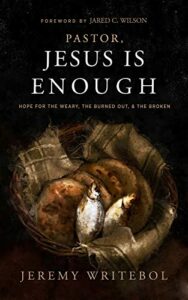 Pastor, Jesus Is Enough: Hope for the Weary, the Burned Out, and the Broken Jeremy Writebol (Lexham Press) $16.99 OUR SALE PRICE = $13.59
Pastor, Jesus Is Enough: Hope for the Weary, the Burned Out, and the Broken Jeremy Writebol (Lexham Press) $16.99 OUR SALE PRICE = $13.59
I almost listed this in the previous BookNotes which highlighted some quick reads for pastors that may feel a bit demoralized. I wanted to call it Pastor, Jesus Is Enough, Already, but that was a bit too whimsical for the content.I suppose one reason I didn’t cite this one in that bunch for pastors is that it is intense. Honest. Complex. Biblically engaged. Really real, even raw, but deeply, profoundly gospel-based and Christ-centered. It’s strong, but not simple or cheery.
Writebol is a pastor of a big church and executive director of a publishing venture called Gospel-Centered Discipleship. They are impeccably about Christ and his grace, missional, evangelical. Writebol fits the perfect pastor mold, modeling solid doctrine and Biblically-oriented faith, caring and Christ-like. But yet. But yet. He knows something can go wrong — deeply wrong. And these days, even in his own ministry, things can take a bad turn.
Not only are pastors (perhaps now more than ever) discouraged and hurting, but some (get this) are more in love with their ministry than they are with their Lord. Some may serve the Kingdom, but they ignore the King. Maybe that is part of what sets this book apart, as it explores those who are so dedicated and who try to be so “more than enough” that they don’t feel like they even need God. Mainline pastors like Eugene Peterson wrote about this decades ago, this love for the organized religious delivery system (church, in that view) that is disconnected to a real, live, daily walk of faith.
Another thing that really sets apart Pastor, Jesus Is Enough is the format, his way into this heavy topic. He explores the famous seven letters that Jesus (through John) wrote to the cities in Revelation 2 – 3. You know some of them, at least… it’s a good approach, an uncommon book on these seven words. Jeremy discovers, alas, that these are not just to the churches (each with a unique foible or sin) but to pastors of those churches. In each, the leaders (whether tired or hurting, drifting or sinfully straying) are reminded of Christ’s sufficiency. These are warnings but also promises. They are, Writebol tells us, “words of life.” It’s a very good book.
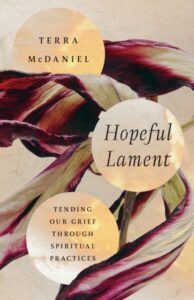 Hopeful Lament: Tending Our Grief Through Spiritual Practices Terra McDaniel (IVP) $18.00 OUR SALE PRICE = $14.40
Hopeful Lament: Tending Our Grief Through Spiritual Practices Terra McDaniel (IVP) $18.00 OUR SALE PRICE = $14.40
Well, I love to say often how much I trust InterVarsity Press and how much I appreciate their eye for good writing, thoughtful, evangelical-ish authors, solid authors of mature faith, addressing the reading world with verve. This book sure seems to be quintessential — for thoughtful readers, but not academic, for those wanting serious reading, but work that is down to earth, practical, useful.
And this topic — oh my, Terra McDaniel is surely not the first to advise those in grief towards classic contemplative disciplines, but this may be the first major book about this tool. She insists that we need to rediscover the lost practice of lament, which can help us to process personal and communal mourning. She calls it “tending” our grief. I’ve just begun this and love it already.
As it says on the back, “Hopeful Lament makes space for the powerful act of crying out before a loving God and offers provoking reflection questions, embodied practices, and includes applications for families with children.” This is designed to help us all better learn to journey gently through suffering, discerning how it can be transformative.
Lament and sadness go together, but they are not the same thing. Terra McDaniel poignantly shows how Christian lament is about disciplined sadness, holy prayer, formative practices, and believing in the possibility of hope without rushing to joy prematurely, all because of Christ. We will all grieve, there is a way to learn to grieve well, and this is a faithful guide and companion. — Nijay K. Gupta, professor of New Testament at Northern Seminary and author of Tell Her Story
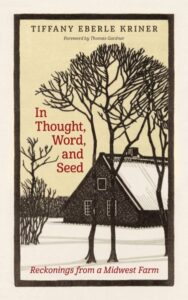 In Thought, Word, and Seed: Reckonings from a Midwest Farm Tiffany Eberle Kriner (Eerdmans) $19.99 OUR SALE PRICE = $15.99
In Thought, Word, and Seed: Reckonings from a Midwest Farm Tiffany Eberle Kriner (Eerdmans) $19.99 OUR SALE PRICE = $15.99
It’s a standard question in author interviews: have there been books that you’ve purchased just because of the cover. Ha! Book lovers everywhere know the answer to that. Of course. And we do it here, taking on a stack of inventory, convinced that a classy cover will necessarily mean classy writing. Of course, that’s dicey and sometimes not at all the case. But it often rings true as sparkling prose inspires a designer to do her best, finding cover art that captures the tone of the book itself. That certainly is the case with the cleverly titled In Thought, Word and Seed.
The woodcut art on the cover, by the way, is from 1918, by Dutch artists Julie de Graag.
Cover aside, this is a brilliantly crafted collection of lyrical essays, what Phil Christman (of the seriously acclaimed Midwest Futures) called a “beautifully written book.” He continues, saying that it “turns the cliches of an evangelical childhood into a robust adult faith, the fragments of American history into a story of repentance and renewal, and a beat-up bit of land into a life-giving farm.” Okay, then.
In the excellently done, thoughtful introductory foreword by Thomas Gardner, Gardner calls these pieces, so much about literature and land, “spiritual improvisations.” Another writer said In Thought, Word, and Seed offered “smorgasbord of genres.” It is tasty, but somewhat demanding. These are rich, serious essays, full of ruminations on writing and literature, simply and compellingly entitled Field, Grass, Forest, Clearing and Wattle. An epilogue ends with “Christ Have Mercy.”
My friend Brian Walsh, co-author of Romans Disarmed and Beyond Homelessness has a lovely blurb. Claude Atcho (of Reading Black Books) says it is “genuinely remarkable and gloriously undefinable.” Beth Felker Jones notes the shades of Wendell Berry, Annie Dillard, and Julian of Norwich. She assures us it has a voice all its own and she says that voice is “luminous. Audacious. Holy.”
Ever buy a book for the cover and the amazingly wise and superlative blurbs by people you trust?
Trust me, this is a lovely, thoughtful, book, complicated and not easy to describe, even though the random essays weave together and developing into a memoir of a bookish couple (she is a English prof at Wheaton who has written a scholarly classic offering a “eschatology of reading”) who also care about home and place and land. Their northern Illinois “Root and Sky Farm” farm is quite a rugged place. Her ruminations are intelligent and beautiful. Very highly recommended.
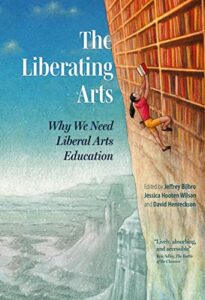 The Liberating Arts: Why We Need Liberal Arts Education edits by Jeffrey Bilbro, Jessica Hooten Wilson & David Henreckson (Plough Publishing) $19.95 OUR SALE PRICE = $15.96
The Liberating Arts: Why We Need Liberal Arts Education edits by Jeffrey Bilbro, Jessica Hooten Wilson & David Henreckson (Plough Publishing) $19.95 OUR SALE PRICE = $15.96
In the past generation there was (thanks be to God) somewhat of a renaissance of the notion of distinctively Christian learning. There has been much worldviewish scholarship and Biblically-grounded social initiatives, thoughtful engagement with the world in fresh, dynamic, and uniquely Christian ways. We have tried to underscore and amplify this kind of deeply Christian orientation that yields fruitful Kingdom insight for learning and life (across the college curriculum and in all zones of professional and public life.) Three cheers for the many good books on faith and life, worship and work, prayer and politics, spirituality and science, even for what philosopher Herman Dooyeweerd called “the inner reformation of all the sciences.”
Many of the best such books, (some written years ago, now) that called for a new energy for integrating faith and scholarship were inspired by a more-or-less Reformed world and life view; some drew on the beloved quotes of public theologian Abraham Kuyper (you know, the “every square inch” guy.) If Christ is indeed claiming “every square inch” of creation, then we need those who consider each and every square inch, who can help us along the journey, in if not of the world.
Enter this new book by a mostly younger generation of scholars and practitioners, lovers of books and of life-long learning, many who are not rooted in the Dutch reformational vision of Kuyper et al. Some of the many good writers here may be in that circle of influence but most are not, or so it seems. This is, in the best sense, a delightfully ecumenical book. From Peter Mommsen (of the Bruderhof) to Rachel Griffins (from Spring Arbor University), from David Hsu (who has worked in industry and is now in the engineering department at Wheaton) to L. Gregory Jones (formerly of Duke, now President of Belmont), these are all leaders from mostly other Christian faith traditions, each saying why the liberal arts still matter.
It is just thrilling to read pieces by the likes of Emily Auerback who founded the Odyssey Project and co-hosts University of the Air on Wisconsin Public Radio, and Zena Hitz, of St John’s College in Annapolis (and author of Lost in Thought: The Hidden Pleasures ofd An Intellectual Life) and the brilliant critic and scholar Jonathan Tran of Baylor. There are a few classical education advocates, Steve Prince, a black visual artists, now at William and Mary, and Columbia University medical ethics doctor Lydia Dugdale who wrote the widely-acclaimed Lost Art of Dying. It didn’t surprise me to see here the eloquent Anne Snyder, the editor of Comment and host of the Whole Person Revolution podcast.
This new cohort of educators and public thinkers are here “reimagining and re-articulating what a liberal arts education is for and what it might look like in today’s world.” I like how many of them are showing how all of this plays out in spaces outside of the typical college classroom. Whether you are connected to institutions of higher learning or not, The Liberating Arts is a treasure trove.
As the back cover puts it:
“In each chapter, dispatches from innovators desire concerned ways this is being put into practice, often outside the academy, showing that the liberals arts are not only viable today, but vital to our future.”
Not every book on a mostly Anabaptist, indie-press publishing house gets a rave review in Harper’s Magazine. As Jon Baskin notes, this book is “lucid and inspiring” and that it shows how the liberals arts “remind us that nothing is more fundamental to preparing citizens to live in a pluralistic society.”
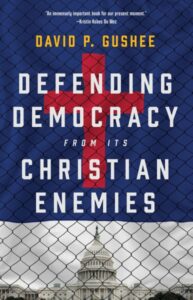 Defending Democracy from Its Christian Enemies David P. Gushee (Eerdmans) $21.99 OUR SALE PRICE = $17.59
Defending Democracy from Its Christian Enemies David P. Gushee (Eerdmans) $21.99 OUR SALE PRICE = $17.59
This was another one of these books that we have long been awaiting — I had the privilege of getting an advanced copy and was taken in by its study of jurisprudence and political history — and while I thought of grouping it with a forthcoming BookNotes column on books about the rise of white Christian nationalism and the “red state Christian” phenomenon of those who have fallen for the MAGA idolatry, I just couldn’t wait. We’ll list this with others, later — there are a lot, these days — but, for now, it’s good to announce any new David Gushee book that arrives, especially one that is so judicious. Yes, he is sure that the American republic, and her democratic ways, is in danger. There are authoritarians who are, too often, weirdly promoted by a reactionary sort of Christianity. And this book cautiously, carefully, teaches about what ideologies are behind some of the global trends towards anti-democratic and authoritarian regimes.
Gushee was once a young evangelical being tutored by the best in public theology — from Ron Sider to James Skillen to Glen Stassen and informed by important scholarship such as that by Michael Walzer — and in those years he was often in conversation with politically conservative faith leaders (think of Jerry Falwell and Pat Robertson, say) so you could reasonably say he has been at this a long time. The struggle against bad Christian sorts of nationalisms has been in the wind for as long as Gushee has been a Christian and this, now, is his clear-headed manifesto for what Hak Joon Lee of Fuller Theological Seminary calls “a timely, eloquent, and compelling apologetic for democracy.”
Two things you might want to know: first, Gushee shows that our political chaos and the rise of religiously-motivated authoritarians is not merely a US phenomenon; he has a chapter each on the recent drift towards anti-democratic impulses in Poland, in Orban’s Hungary, and in Bolsanaro’s Brazil. You will learn much, I bet, and it will be alarming, even if the prose is sober. Wisely, too, David frames these three chapters with two historic explorations (“Reactionary Politics in France, 1870 – 1944” and “The Politics of Cultural Despair in Germany, 1853 – 1933.”) He admits that every chapter here is short and the material succinct. But it is strong and illuminating and offers details that are good to know, case studies to help us see more clearly the dangers of “authoritarian reactionary Christianity” in our current Trump-era United States.
David helpfully looks that three Christian traditions whose robust public theologies offer pro-democracy undergirding, traditions from which we can learn as we deepen our political mindfulness and civic habits of firming up our Republic. He has a chapter each (and a big ‘ol chart) on The Baptist Democratic Tradition, the Black Christian Democratic Tradition, and Covenantal Christian Political Ethics.
(Please remember here that he is not necessarily advocating for the Democratic Party, as such, but is writing about the broader traditions that affirm democracy.)
This carefully researched book is accesible but should be interesting for scholars and specialists. There are discussion questions for groups serious enough to want to read it together, something I’d highly recommend. We indeed live, as John Adams put it, in “serious times.” This thoughtful, judicious work is a major contribution towards revitalized and faithful Christianly-shaped, pro-democracy renewal.
Just listen to these wise promotional endorsements by important public scholars:
David Gushee has written that rare book that combines reader-friendliness, moral clarity, and political detail. A stellar accomplishment much needed today. Gushee sets America’s sociopolitical rifts in context and guides the reader to big-picture thinking about what’s at stake in the world today, and he does it in a way that is both elegant and heartfelt. Read it and give it to everyone you know. — Marcia Pally, author of White Evangelicals and Right-Wing Populism: How Did We Get Here?
Unflinching in his analysis, David Gushee traces the sobering history of Christianity’s all too frequent complicity in authoritarian rule. Yet Gushee also shows how Christians have within their faith the tools to restore democracy at this critical juncture. Reminding readers that democracy must be fought for, Gushee equips the American church for this battle. Defending Democracy from Its Christian Enemies is an immensely important book for our present moment. — Kristin Kobes Du Mez, Calvin University, author of Jesus and John Wayne: How White Evangelicals Corrupted a Faith and Fractured a Nation
This is an important book. It asks about the ways in which Christians may favor autocratic politics over democracy and does not shy away from difficulties. It analyses how authoritarian regimes can legitimate their power by playing into religious sentiments. Thus, it gives a theological foundation to the need for political awareness within Christian circles. — Bert Jan Lietaert Peerbolte, Vrije Universiteit, Amsterdam
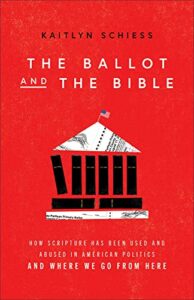 The Ballot and the Bible: How Scripture Has Been Used and Abused in American Politics – And Where Do We Go From Here Kaitlyn Schiess (Brazos Press) $19.99 OUR SALE PRICE = $15.99
The Ballot and the Bible: How Scripture Has Been Used and Abused in American Politics – And Where Do We Go From Here Kaitlyn Schiess (Brazos Press) $19.99 OUR SALE PRICE = $15.99
Well, if the vibrant and semi-scholarly Gushee book, above, inviting us to resist an alt-right Christian takeover of our public institutions doesn’t quite grab you, this one, also about faith and politics and the Bible, might suit better for you. (Or, ideally, get ‘em both!)
Kaitlyn Schiess, with a ThM from Dallas Theological Seminary, is now working on a PhD at Duke, and wrote one of the very best introductory books on why people of faith should be careful about forming political attitudes and civic habits. In her groundbreaking The Liturgy of Politics, she invited us to ponder how we are formed, how our virtues and instincts and public views develop (and from what sources.) Not wanting to be beholden to any worldly ideology right or left, she calls for us to be truly Biblical as we evaluate the many competing political ideologies influential in today’s public debates. If that book showed her to be wise beyond her years (as James Skillen put it in his review), this book steps back a bit and reflects on how use (and, often, misuse) of the Bible has always been a part of the American civic discourse.
The Ballot and the Bible is good history, a book that has been recommended by folks as diverse as history-writers Jemar Tisby (The Color of Compromise) and Karen Swallow Prior (The Evangelical Imagination) and politico Michael Wear. Michael (the president and CEO of the Center for Christianity and Public Life) and author of the forthcoming The Spirit of Our Politics, says it offers “keen, level-headed, and perceptive insights” into the use of Scriptures in our political life.
She starts the book with the puritan Biblical interpretations during the colonial years, has a good chapter on Romans 15 and American identity, a bit on the Bible “through slave-holding spectacles” during the Civil War era, and moves from the social gospel (and the unique hermeneutics of that movement) into the various views of Scripture on both sides of the civil rights struggle. She has a good chapter on the conservative movement of Bush and Reagan who believed in “the magic of the market” and had a “small government” hermeneutic even as another chapter explored the notions of Biblical eschatology during the cold war. (That chapters offered a clever nod to Hal Lindsey by calling it “The Late Great United States.”)
On she goes, comparing and contrasting the use of the Bible by George W. Bush and Barack Obama, and one chapter on Donal Trump’s appeal to evangelicals. The closing chapter is called “Seek the peace and prosperity of the city” which offers a wise reflection on “Jeremiah 20 and Political Theology.” Throughout the book she offers this dual concern, both the peril and the promise (as she calls it) of Biblical references in political life.
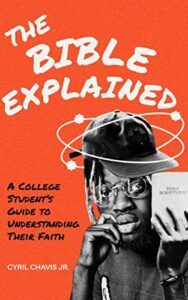 The Bible Explained: A College Student’s Guide to Understanding Their Faith Cyril Chavis Jr. (Hides Publishing) $14.99 OUR SALE PRICE = $11.99
The Bible Explained: A College Student’s Guide to Understanding Their Faith Cyril Chavis Jr. (Hides Publishing) $14.99 OUR SALE PRICE = $11.99
I bet you don’t know this book. And you should, really. If you care for college students at all, or if you work in campus ministry, this great new title could be a real resource for your work.
Time or space does not allow me to describe all the wit and clever writing in The Bible Explained nor can I say much about what makes it useful, other than the obvious. And that includes three main features.
Firstly this is designed for black college students. The author is himself in campus ministry at Howard University, and that means it is, itself, an extraordinary resource, emerging as it does from his thoughtful work among the intellectually curious (and sometimes skeptical) African American students there. The author is one of the handful of black campus works for the PCA-related Reformed University Fellowship. He knows his way around black youth culture. (His own seminary degree is from Reformed Theological Seminary in Jackson, Mississippi.) Dig that.
Secondly, this is a book that wisely invites seekers into the broad narrative of Scripture. Sure, there is plenty of stuff about interpreting given texts, rules of the road for reading the Bible, explanations of genre and context. But helping people come to a deeper, appropriate understanding of God’s Word is offered with a combo of common-sense reading strategies and classic, basic hermeneutical insights, with this big picture vision of the scope of the story, the whole unfolding drama of God’s mighty acts and redemption promised and fulfilled.
Thirdly, although it is a complex and healthy conversation to have, I’ll say that it is clear that the author is himself not only good Bible teacher who wants to help young adults discover the Scriptures for themselves, but he is an evangelist, wanting people to meet the God behind the story, the Christ who is the star of the story, and Spirit who directed the writing and keeps the sacred story alive even now.
God is “more glorious and enjoyable than you ever knew,” Chavis promises, with a hint of the famous answer from the Westminster Catechism, which he surely knows. Yet, he invites young adults into this hope of glory, by way of teaching them about the Bible. Even though it is written by a black pastor to black students at historically black colleges and universities, I think it is useful for nearly anyone wanting a sensible way to introduce the Scripture afresh to seekers.
One young black woman from Howard University wrote to thank Cyril for this rather rare book. She wrote, “Thank you for thinking of us the whole way; I felt seen and thought about as a black reader.” Nice, huh?
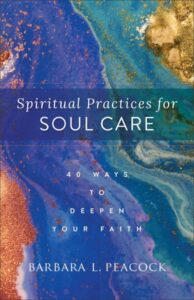 Spiritual Practices for Soul Care: 40 Ways to Deepen Your Faith Barbara L. Peacock (Baker Books) $18.99 OUR SALE PRICE = $15.19
Spiritual Practices for Soul Care: 40 Ways to Deepen Your Faith Barbara L. Peacock (Baker Books) $18.99 OUR SALE PRICE = $15.19
My goodness, gracious, what a jam-packed set of wise suggestions for anyone who wants to try something new, fresh, classic, deepening their own sense of connection to the divine, actually growing in their spiritual lives! This book is for anyone who has felt stalled by heavy talk of mystical disciplines or who hasn’t had time to ponder a whole, transformative Rule of Life or settled into life-changing rhythms. In other words, this is about simple, restorative practices that you can do today.
In fact, each chapter has “today” in the titles. Stuff you can do today.
Barbara Peacock is an award-winning author as well as a passionate spiritual director. (Her master’s is from Princeton Theological Seminary and her DMin from Gordon Conwell.) She is in Charlotte NC and is known for her groundbreaking book about spirituality within the historic black church tradition. You may know it, Soul Care in African American Practice, published by IVP.
Here, she invites us, yes, to “embrace rhythms that lead to true flourishing.” But she knows that many need help in learning about and trying spiritual practices that can be put into practice right away. If you yearn to go deeper and learn some new options for your quiet time, this book is tremendous.
In each entry she has a “soul care leader” in which she gives a little biography of somebody known for that teaching, and it’s a wide array of leaders, from Henry Blackaby to Howard Thurman, John Newton, Marva Dawn, Dallas Willard, and so many more. And, she has a “Scripture Focus” for each practice.
It is arranged around seven sections (with several practical “today” chapters under each.) She writes well around “Soul Care Living”, “Soul Care Directing”, “Soul Care Discipling”, “Soul Care Restoring”, “Soul Care and Self-Care”, “Should Care Reflecting”, and “Soul Care Liberation.” She has short, suggestive and instruction chapters like “Reading Today” and “Chastening Today” and “Storytelling Today” and “Entering Today.” From very obvious (one on exercising — Serena Williams is her guide for that one — and one on praying) to the more allusive— “Readying Today” or “Dwelling Today” — she covers a lot of ground and offers wise counsel. This is a great handbook, a treasure trove. You should get it!
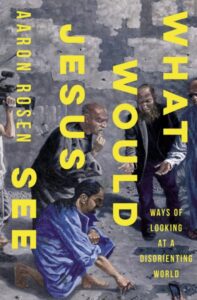 What Would Jesus See: Ways of Looking at a Disorienting World Aaron Rosen (Broadleaf Books) $26.99 OUR SALE PRICE = $21.59
What Would Jesus See: Ways of Looking at a Disorienting World Aaron Rosen (Broadleaf Books) $26.99 OUR SALE PRICE = $21.59
Sometimes a book is just so very interesting, so unique and compelling, I have to tell you about it. And when the author makes themselves known as someone immediately likable, generous, charitable, curious, interesting, well, the book is a winner. In this case, the thesis of the book is striking and the author (a serious Jewish scholar of the arts) seems to be a heck of a guy. I’m impressed. I think some of our readers are going to love this one of a kind book.
Here’s the short version, although it deserves a more detailed survey and critique. It is trying to invite readers into an ethical space where they imagine what Jesus would see — based, mostly, on accounts in the gospel of what he did see — and, in a way, replace the nearly vapid WWJD slogan. Actually, drawing on the likes of The Imitation of Christ, Rosen knows that asking how to do the things that Jesus did is pretty revolutionary, even if rendered nearly copied by today’s consumerist culture. Still, it’s not a bad question, WWJD, and Rosen only wants to expand and deepen it.
He is a visual guy, a Jew who teaches Christian seminarians (at Wesley Theological Seminary in DC.) He is engaged often with Christian comrades in the movement of artists and writers who publish in Image (he thanks Jamie Smith and Lauren Winner.) His wife is an Episcopal priest, so he knows the Christian tradition well. And he is drawn to the Jesus described in the New Testament.
Here’s the thing: as Professor Rosen helps us learn to “see” in fresh ways, through the Jesus lens, let’s say, he is inviting us to a renewed vision of “radical empathy.” And as an arts curator, he does that not only through a close reading of episodes from Matthew, Mark, Luke, and John, but from the great history of art devoted to the scenes of Jesus. He defends this, as a Jew, in the first chapter with a moving story from the great Jewish novel, My Name is Asher Lev, the memorable part where Lev is chastised by his Jewish art mentor when he wants to turn away from all of the pictures of Jesus in the art museum. Just a few pages in and you know this is going to be a great, fun, and challenging book.
Bill McKibben says it is “a clever — and timely — way to phrase this question.” Eboo Patel (the Muslim founder of Interfaith America) says it is “an interesting, creative, and compulsively readable book.” It is all of that, interesting, clever, timely, and readable. I think, mostly, it will help us all understand Jesus just a bit more, live into the chasm between what we claim and what we do, by discerning a bit about how we see. What an intriguing, captivating book!
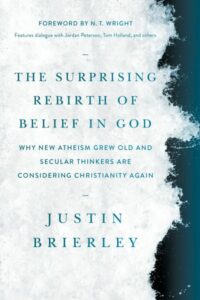 The Surprising Rebirth of Belief in God: Why New Atheism Grew Old and Secular Thinkers are Considering Christianity Again Justin Brierley (Tyndale Momentum) $17.99 OUR SALE PRICE = $14.39
The Surprising Rebirth of Belief in God: Why New Atheism Grew Old and Secular Thinkers are Considering Christianity Again Justin Brierley (Tyndale Momentum) $17.99 OUR SALE PRICE = $14.39
Okay, just for starters, this isn’t written by our Dordt College friend Justin Bailey, who wrote Reimagining Apologetics, which might be simpatico with Justin Brierley’s new one. Brierley’s new Surprising Rebirth… has nicely emerged from his long years of working in a UK broadcast interviewing atheists, mostly. He documented that in a nice little book a few years ago called Unbelievable?: Why After Ten Years Of Talking With Atheists, I’m Still A Christian. Unbelievable, almost, that his show, Unbelievable, brought many with such harsh critiques of Christian faith to the fore, and he struggled with them all, discerning answers to the most common objections non or anti-Christians have with historical Christian conviction.
This new one is a more wide-ranging survey, and is remarkable, suggesting that — against what the popular press might be saying — there may be a return to belief in recent times.
The book has nice blurbs from the likes of Philip Yancey — if Yancey likes something, you know it is well written and thoughtful. Phil calls it “stimulating” and notes that it “sounds a hopeful note.” This hopeful note, curiously, was inspired by an interview Brierley did with an agnostic journalist who sensed that the rigid atheist of a decade or so ago was in decline. This book was the fruit of his deeper analysis and vast numbers of interviews, conversations, and debates (both public on his radio show and in personal dialogue.
The forward to The Surprising Rebirth of Belief in God is by N. T. Wright, who the author works with often in England. A good number of famous thinkers show up, here, from Jordan Peterson to Tom Holland and he narrates the debates he hosted, such as the one between Richard Dawkins and Francis Collins. So, clearly, he’s no slouch and this is not a simplistic screed or overblown hope. Just the stories of the people he’s met are fascinating, but his project, weaving them into a note of hope, is fascinating and rather compelling. I think some of our readers need this book.
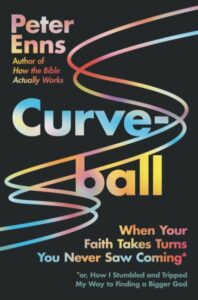 Curve-ball: When Your Faith Takes Turns You Never Saw Coming (Or, How I Stumbled and Tripped My Way to Finding a Bigger God) Peter Enns (HarperOne) $29.99 OUR SALE PRICE = $23.99
Curve-ball: When Your Faith Takes Turns You Never Saw Coming (Or, How I Stumbled and Tripped My Way to Finding a Bigger God) Peter Enns (HarperOne) $29.99 OUR SALE PRICE = $23.99
This is a book I couldn’t put down and, agree or not, it is interesting, honest, appealing, and sensible. I have been wanting to write about it, but have been waiting for a long-in-coming, epic BookNotes I want to do about the passel of books about doubt, deconstruction, and the trend of evangelicals leaving the tradition, if not the faith. But I just couldn’t wait for that big post, and wanted to name this one, here, now.
It is indeed about what some call deconstruction. Dr. Enns was a conservative Bible scholar who taught at the exceptionally strict Westminster Theological Seminary and was booted out there when he opened himself to minor differences within their hyper Reformed faith system. He wrote a brilliant book about that called The Sin of Certainty: Why God Desires Our Trust More Than Our Correct Beliefs and then wrote a handful of books about how his view of the Bible developed and how to wisely read the Bible more faithfully.
Curveball, in a way, is a personal memoir and a guide to how to navigate faith when questions arise and one realizes one must be honest before the big questions. As Thomas Jay Oord puts it, “Pete Enns’s spiritual memoir combines wit and wisdom, along with biblical and theological insights! The vision God Pete humbly proposes is different from the one many of us were given. And far more winsome.” I guess this is a theme of the book — shown in the subtitle, especially — that as we grow and leave some unfruitful for untrue notions behind, we can find a bigger, truer, better, God, not the simplistic constructs of whatever theological system in which you were taught.
With blurbs on the back from Sarah Bessey and Brian McLaren and Jonathan Merritt, my fear is that some customers, allergic to these sorts of writers, may think ill of the author and not give the book a chance. Yet, as Merritt nicely says on the back, the book “reminds readers that with crises are not something to be feared but are opportunities for spiritual growth that can hep you re-embrace God as more beautiful, loving, and mysteries.”
Isn’t that what you who are understandably concerned about the ease of talk of deconstruction these days want, for those drifting from faith to return, sobered, but in love with God all the more? Pete is funny and he is smart and he is a bit cynical, but he loves God, and this book shows it. Who knows what life will throw our way next? Curveball will help. And even if you’re not in a scary or disconcerting space of deconstruction, you’ll learn some stuff. Enjoy and ponder.
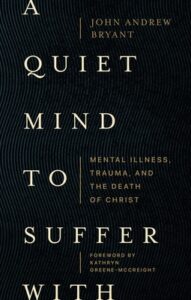 A Quiet Mind to Suffer With: Mental Illness, Trauma, and the Death of Christ John Andrew Bryant (Lexham Press) $19.99 OUR SALE PRICE = $15.99
A Quiet Mind to Suffer With: Mental Illness, Trauma, and the Death of Christ John Andrew Bryant (Lexham Press) $19.99 OUR SALE PRICE = $15.99
There are bunches of books — some very serious, some less so — on mental health issues these days and, to be really frank, when publishers known for solid, no-nonsense historically conservative theology weigh in, I sometimes worry. Are they so dogmatic for doctrine that they miss the human messiness of our fallen world? Can such theological worldviews accommodate the loose ends of hurting people without shunting off the pain to some gospel-centered cover-up? Or, worse, subtly blame the victim? It happens.
Yet, I respect Lexham Press. And I couldn’t shake that cover, with the first and last words nearly off page, sliced, on the edge? Further, greatly appreciate the woman who wrote the forward to this, Kathryn Green-McCreight, herself the author of the extraordinary memoir about her bi-polar disorder, Darkness Is My Only Companion. And then I realized that I was at a conference with this guy, once. His formate housemates are among our best customers, dear friends in Western PA who we deeply respect. No wonder I liked the smell of this.
Once I started it I realize it was a very special book. There is a glossary in the front – a bit odd, maybe — naming phrases he uses in the book. When one is as mentally ill as Mr. Bryant, things can get dark. As a poet and artist, he does an excellent job being especially creative in the writing even as his theology and prose are clear as a bell. It blends honest and human-scale creative writing with straight-arrow, Biblical insight, true truth of the best sort.
Some of the trauma John experienced, he only alludes to, but I know it has to do with church abuse and abandonment. There have been other serious pains, and this chronic illness. As a seminary trained thinker, though, he knows a thing or two that we all can learn from. A Quiet Mind is both for anyone wanting insight about a Christ-centered view of mental health issues, and for anyone struggling with mental illness. This is a handsomely designed paperback, creatively written, and with exceptionally solid, Biblical orientation. I am sure some will come to value it. Spread the word.
+++
TO PLACE AN ORDER
PLEASE READ, THEN SCROLL DOWN AND CLICK ON THE “ORDER HERE” LINK BELOW.
It is helpful if you tell us how you want us to ship your orders.
The weight and destination of your package varies but you can use this as a quick, general guide:
There are generally two kinds of US Mail options and, of course, UPS. If necessary, we can do overnight and other expedited methods, too. Just ask.
- United States Postal Service has the option called “Media Mail” which is cheapest but can be a little slower. For one typical book, usually, it’s $4.12; 2 lbs would be $4.87. This is the cheapest method available.
- United States Postal Service has another, quicker option called “Priority Mail” which is $8.50, if it fits in a flat-rate envelope. Many children’s books and some Bibles are oversized so that might take the next size up which is $9.20. “Priority Mail” gets much more attention than does “Media Mail” and is often just a few days to anywhere in the US.
- UPS Ground is reliable but varies by weight and distance and may take longer than USPS. Sometimes they are cheaper that Priority. We’re happy to figure out your options for you once we know what you want.
If you just want to say “cheapest” that is fine. If you are eager and don’t want the slowest method, do say so. It really helps us serve you well so let us know.
BookNotes
SPECIAL
DISCOUNT
20% OFF
ALL BOOKS MENTIONED
+++
order here
this takes you to the secure Hearts & Minds order form page
just tell us what you want to order
inquire here
if you have questions or need more information
just ask us what you want to know
Hearts & Minds 234 East Main Street Dallastown PA 17313
read@heartsandmindsbooks.com
717-246-3333
Sadly, as of September 2023 we are still closed for in-store browsing. COVID is not fully over. Since few are reporting their illnesses anymore, it is tricky to know the reality but the best measurement is to check the waste water tables to see the amount of virus in the eco-system. It is bad and now getting worse. It’s important to be aware of how risks we take might effect the public good — those at risk, while not dying from the virus, are experiencing long-term health consequences. (Just check the latest reports of the rise of heart attacks and diabetes among younger adults, caused by Covid.) It is complicated, but we are still closed for in-store browsing due to our commitment to public health (and the safety of our family who live here, our staff, and customers.) Our store is a bit cramped without top-notch ventilation, so we are trying to be wise. Thanks for understanding.
We will keep you posted about our future plans… we are eager to reopen.
We are doing our curb-side and back yard customer service and can show any number of items to you if you call us from our back parking lot. It’s sort of fun, actually. We are eager to serve and grateful for your patience as we all work to mitigate the pandemic. We are very happy to help, so if you are in the area, do stop by. We love to see friends and customers.
We’re happy to ship books anywhere.
We are here 10:00 – 6:00 EST / Monday – Saturday. Closed on Sunday.

